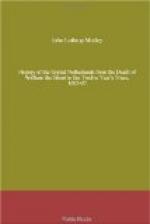Where, then, could even a loophole be found through which the possibility of a compromise could be espied? The ideas of the contending parties were as much opposed to each other as fire and snow. Nevertheless, the great forces of the world seemed to have gradually settled into such an equilibrium as to make the continuance of the war for the present impossible.
Accordingly, the peace-party in Brussels had cautiously put forth its tentacles late in 1606, and again in the early days of the new year. Walrave van Wittenhorst and Doctor Gevaerts had been allowed to come to the Hague, ostensibly on private business, but with secret commission from the archdukes to feel and report concerning the political atmosphere. They found that it was a penal offence in the republic to talk of peace or of truce. They nevertheless suspected that there might be a more sympathetic layer beneath the very chill surface which they everywhere encountered. Having intimated in the proper quarters that the archdukes would be ready to receive or to appoint commissioners for peace or armistice, if becoming propositions should be made, they were allowed on the 10th of January, 1607, to make a communication to the States-General. They indulged in the usual cheap commonplaces on the effusion of blood, the calamities of war, and the blessings of peace, and assured the States of the very benignant disposition of their Highnesses at Brussels.
The States-General, in their reply, seventeen days afterwards, remarking that the archdukes persisted in their unfounded pretensions of authority over them, took occasion to assure their Highnesses that they had no chance to obtain such authority except by the sword. Whether they were like to accomplish much in that way the history of the past might sufficiently indicate, while on the other hand the States would always claim the right, and never renounce the hope, of recovering those provinces which had belonged to their free commonwealth since the union of Utrecht, and which force and fraud had torn away.
During twenty-five years that union had been confirmed as a free state by solemn decrees, and many public acts and dealings with the mightiest potentates of Europe, nor could any other answer now be made to the archdukes than the one always given to his holy Roman Imperial Majesty, and other princes, to wit, that no negotiations could be had with powers making any pretensions in conflict with the solemn decrees and well-maintained rights of the United Netherlands.
It was in this year that two words became more frequent in the mouths of men than they had ever been before; two words which as the ages rolled on were destined to exercise a wider influence over the affairs of this planet than was yet dreamed of by any thinker in Christendom. Those words were America and Virginia. Certainly both words were known before, although India was the more general term for these auriferous regions of




